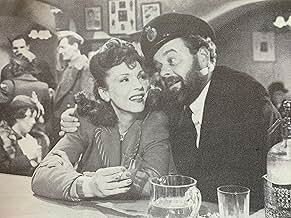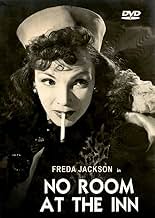Ajouter une intrigue dans votre langueTwo children are evacuated during World War Two into the care of an alcoholic woman.Two children are evacuated during World War Two into the care of an alcoholic woman.Two children are evacuated during World War Two into the care of an alcoholic woman.
- Director
- Writers
- Stars
Marie Ault
- Vicar's Maid
- (uncredited)
Vera Bogetti
- Barmaid
- (uncredited)
Avis en vedette
Yes i was in the same boat.With a dragon of a woman chasing my sister brother and me, i think for her sport.The scene that stands out for me was when one of them say's You.v Broke Me Bleed-en feather.I remember very well the war years.Three of my cousins were buried alive in the blitz of Portsmouth.Being a naval port it got it's share.We ended up living in tent's courtesy of the army.I think this film depicted some of the deplorable situations that children were placed in.I think the small amount of comedy gave it the lift it so badly needed.I know it made an everlasting impression on me.I wonder if by to-days standards it would have won Best Picture Of The Year.I should think so.
From the opening shot of a department store, with a background choir singing "Once in Royal David's City," this turns out to be an engrossing, evocative & still-powerful film, which has much merit in the message it portrays. Although it dates from 1948, and I have only seen the truncated version of 63 minutes (does anyone have the full version available?) the film is a credit to all concerned. It carries a direct and hard hitting message, and the influence of the great Dylan Thomas is clear for all to see. The casting is top notch, and Freda Jackson plays a thoroughly despicable, two-faced harridan in grand style. In its day, it must have been a forceful, and probably unpalatable, slice of life, with the exposure of dual standards particularly unsettling in certain quarters. Although a work of fiction, it comes across as very true to life and totally believable. It's a must-see film!
I saw this film for the first time very recently at the Mediatheque at the BFI in London and was stunned by the film itself, and the excellent performances of Freda Jackson and Joan Dowling in particular.
"No Room At The Inn" was originally a stage play by Joan Temple in which Freda Jackson scored an immense success as the despicable Mrs Voray. The play opened at the Embassy Theatre in London in 1945, and Miss Jackson repeated her triumph the following year at the Winter Garden Theatre.
The film's screenplay, based on Temple's play, was co-written by the producer Ivan Foxwell and the celebrated Welsh writer Dylan Thomas, and their skill shines through. The treatment in many ways is surprisingly modern, as is much of the acting. Although the denouement is somewhat melodramatic, the film remains hugely powerful and entertaining. It is also darkly disturbing, and reveals that today's appalling stories of child abuse beloved by the tabloids are nothing new at all.
Other British character actors supply memorable performances. We see Hermione Baddeley in one of her grotesque frowsy harridan roles - her character in "It Always Rains On Sunday" with large knobs on - Sydney Tafler as a dapper spiv, and good old stalwart Dora Bryan (sans ubiquitous plastic mac) as his girlfriend. Tafler's wife, Joy Shelton gives a strong performance as the teacher of Mary O'Rane, who in turn is played by Ann Stephens (familiar as the bad gal of "The Franchise Affair").
It is unquestionably Jackson's film, however, although the delicious Joan Dowling - brilliant as the amoral kid Norma Bates - gives her a run for her money. One wishes much more of Freda Jackson's work had been committed to celluloid.
Apparently the film is not currently available commercially, and I understand has not been shown on British TV since the 1950s. Another reviewer on here states that the BFI informed them it is "in private hands". I hope that this doesn't suggest that for some reason we may never have the opportunity of seeing this film in its entirety.
I have seen a copy of a 16mm version - not at the BFI - and as far as I am aware that is the only copy in any sort of circulation at present. However, I believe this was from a later release of the film that was cut down - (possibly to be part of a double feature?).
Unfortunately so severe is the truncation of this version that in parts it makes little sense, and indeed some of the very best scenes have been cut - for example Joan Dowling's magnificent "cockney" version of the Cinderella story. This scene alone shows this tragically short-lived actress at her very finest, and it is sorely missed.
The shortened version loses more than 30 valuable minutes I'm afraid, so to those who have never seen this film, I recommend - if it is at all possible - that you see the version held by the BFI - either at the Mediatheque, or on screen.
Meanwhile, I am keeping my fingers crossed for a release of the complete version on DVD in the not-too-distant future!
"No Room At The Inn" is a must-see for lovers of good 1940s British dramatic film.
"No Room At The Inn" was originally a stage play by Joan Temple in which Freda Jackson scored an immense success as the despicable Mrs Voray. The play opened at the Embassy Theatre in London in 1945, and Miss Jackson repeated her triumph the following year at the Winter Garden Theatre.
The film's screenplay, based on Temple's play, was co-written by the producer Ivan Foxwell and the celebrated Welsh writer Dylan Thomas, and their skill shines through. The treatment in many ways is surprisingly modern, as is much of the acting. Although the denouement is somewhat melodramatic, the film remains hugely powerful and entertaining. It is also darkly disturbing, and reveals that today's appalling stories of child abuse beloved by the tabloids are nothing new at all.
Other British character actors supply memorable performances. We see Hermione Baddeley in one of her grotesque frowsy harridan roles - her character in "It Always Rains On Sunday" with large knobs on - Sydney Tafler as a dapper spiv, and good old stalwart Dora Bryan (sans ubiquitous plastic mac) as his girlfriend. Tafler's wife, Joy Shelton gives a strong performance as the teacher of Mary O'Rane, who in turn is played by Ann Stephens (familiar as the bad gal of "The Franchise Affair").
It is unquestionably Jackson's film, however, although the delicious Joan Dowling - brilliant as the amoral kid Norma Bates - gives her a run for her money. One wishes much more of Freda Jackson's work had been committed to celluloid.
Apparently the film is not currently available commercially, and I understand has not been shown on British TV since the 1950s. Another reviewer on here states that the BFI informed them it is "in private hands". I hope that this doesn't suggest that for some reason we may never have the opportunity of seeing this film in its entirety.
I have seen a copy of a 16mm version - not at the BFI - and as far as I am aware that is the only copy in any sort of circulation at present. However, I believe this was from a later release of the film that was cut down - (possibly to be part of a double feature?).
Unfortunately so severe is the truncation of this version that in parts it makes little sense, and indeed some of the very best scenes have been cut - for example Joan Dowling's magnificent "cockney" version of the Cinderella story. This scene alone shows this tragically short-lived actress at her very finest, and it is sorely missed.
The shortened version loses more than 30 valuable minutes I'm afraid, so to those who have never seen this film, I recommend - if it is at all possible - that you see the version held by the BFI - either at the Mediatheque, or on screen.
Meanwhile, I am keeping my fingers crossed for a release of the complete version on DVD in the not-too-distant future!
"No Room At The Inn" is a must-see for lovers of good 1940s British dramatic film.
I was Ronnie and my stage name was Stanley Conett (Stanley Heinemann) I played that part for 427 performances at the Winter Garden. Then toured England and Scotland with the show. Also I did the BBC version.It is a pity that you have published the wrong actor's name for the Winter Garden version of the show.
I was too tall to be in the film version. The Theater version often caused the audience to erupt with shouting and curses at Fred Jackson. The show ended with the girls suffocating Mrs.Voray and it was different in the movie.
Ref -corrected version in Wikipedia.
When I saw the film the first time I was scared out of my wits by Mrs Voray. I could empathize with evacuee children as some of them came to my town at the end of the war. The film can be viewed in full length on the Internet these days. As an adult I interpret the film as the interplay of myth and social realism. Mrs Voray has the attributes of a witch even in her looks but more significantly in her power to bewitch town worthies and others by her smarmy insinuations and false charm. I agree with another reviewer that the film recalls the world of the Grimm brothers, Hansel and Gretel particularly. Dylan Thomas was intrigued by images drawn from the world of witches and sinister occult practices. What saves the play from being a moralizing allegory is its keen almost Dickensian observation of people as they are, foibles and all.
Meilleurs choix
Connectez-vous pour évaluer et surveiller les recommandations personnalisées
Détails
- Date de sortie
- Pays d’origine
- Langue
- Aussi connu sous le nom de
- Cendrillon du faubourg
- Lieux de tournage
- société de production
- Consultez plus de crédits d'entreprise sur IMDbPro
- Durée1 heure 22 minutes
- Couleur
- Rapport de forme
- 1.37 : 1
Contribuer à cette page
Suggérer une modification ou ajouter du contenu manquant

Lacune principale
By what name was No Room at the Inn (1948) officially released in Canada in English?
Répondre















